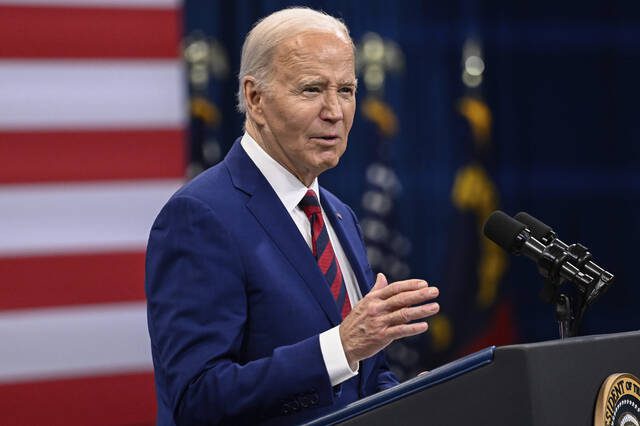Richard Bidon, like many Americans, wishes to see the U.S. government return to its original system of checks and balances created almost 240 years ago to prevent any branch, particularly the presidency, from gaining too much power.
However, this sentiment is mostly expressed when Republicans are in power.
An 84-year-old Democrat named Bidon, who lives near Los Angeles, expressed that if President Joe Biden is reelected, he does not want him to require approval from a potentially Republican-controlled Congress to implement policies to combat climate change. He prefers presidents to have the power to change policies independently, as long as they belong to the right party.
Bidon stated, “When a Democrat’s in, I support” a strong presidency, Bidon said. “When Republicans are in, I don’t support it that much. It’s sort of a wishy-washy thing.”
A recent poll from The Associated Press-NORC Center for Public Opinion Research revealed that Bidon’s perspective is widespread. Although Americans claim they do not want a president to possess excessive power, this view changes if a candidate from their party wins the presidency. This viewpoint is held by members of both parties, but it is especially prevalent among Republicans.
In general, only about 2 in 10 Americans believe it would be “a good thing” for the next president to be able to change policy without having to wait for Congress or the courts. However, nearly 6 in 10 Republicans support the idea of a future President Donald Trump taking unilateral action, while about 4 in 10 Democrats express the same sentiment if Biden is reelected.
This sentiment appears amidst increasing polarization and indicates the public’s readiness to challenge the political framework that has maintained the U.S. as a stable democracy for over two centuries. According to the poll, only 9% of Americans believe the nation’s system of checks and balances is working extremely or very well. This sentiment also follows Trump's pledges to “act as a dictator” on the first day of a new administration to secure the border and expand oil and gas drilling.
Bob Connor, a former carpenter residing in Versailles, Missouri, seeks decisive action on the border. He has lost hope in Congress taking action.
“From what I’ve seen, the Republicans are trying to get some stuff done, the Democrats are trying to get some other stuff done — they’re not mixing in the middle,” said Connor, 56. “We’re not getting anywhere.”
He attributes the influx of migrants to Biden unilaterally revoking some of Trump’s own unilateral border security policies upon taking office.
“I’m not a Trump fanatic, but what he’s saying has to get done is right,” Connor said.
Joe Titus, a 69-year-old Democrat from Austin, Texas, believes Republicans have undermined Congress’ ability to function in its traditional legislative role and asserts that Biden will have to step in to fill the void.
“There’s this so-called ‘majority’ in Congress, and they’re a bunch of whack-jobs,” Titus, a retired Air Force mechanic, said of the GOP-controlled House of Representatives. “It’s not the way this thing was set up.”
The current Congress is setting dubious records as the least productive one in the country’s history, with fewer than three dozen bills sent to Biden’s desk last year. At Trump’s urging, House Republicans have stalled aid to Ukraine and a bipartisan immigration bill.
Titus mentioned that although he generally opposes expanded presidential power, he would support Biden providing more immigration judges and sending additional aid to Ukraine on his own.
“There’s certain things that it seems to me the public wants and the other party is blocking,” Titus said.
The presidency has steadily gained power in recent years as congressional deadlocks have become more common. Increasingly, the nation’s chief executive is moving to resolve issues through administrative policy or executive orders. The U.S. Supreme Court is poised to rule later this year on a case that could significantly weaken the ability of federal agencies — and thus a presidential administration — to issue regulations.
Meanwhile, conservatives are planning a takeover of the federal bureaucracy should they win the White House in November, a move that could increase the administration’s ability to make sweeping policy changes on its own.
The AP-NORC poll found that voters’ views of which institutions have too much power were colored by their own partisanship. Only 16% of Democrats, whose party currently controls the White House, say the presidency has too much power while nearly half of Republicans believe it does. In contrast, about 6 in 10 Democrats say the U.S. Supreme Court, with its 6-3 conservative majority, has too much power.
With Congress evenly divided between the two parties — the GOP has a narrow House majority, Democrats a narrow Senate one — Americans have similar views on its power regardless of party. About 4 in 10 from both major parties say it has too much power.
“I think Congress had too much power when the presidency and Congress were both ruled by Democrats, but now that Republicans are in the majority there’s an equal balance,” said John V. Mohr, a 62-year-old housecleaner in Wilmington, North Carolina.
In contrast, he complained that Biden is “sitting there writing executive orders left and right,” including his proclamation marking Transgender Day of Visibility, which fell on Easter Sunday this year.
The abstract idea of a president with nearly unchecked power remains unpopular.
Steven Otney, a retired trucker in Rock Hill, South Carolina, said major policies should be approved by Congress and gain approval from the courts. But he also said it depends on the topic. He wants to see prompt action on certain issues by the next president if he’s Trump.
“Some things need to be done immediately, like that border wall being finished,” said Otney, a Republican.
He said it’s just common sense.
“If Trump got in there and said ‘I want to bomb Iran,’ no, that’s crazy,” Otney said. “Within reason, not stupid stuff either way. Something to help the American people, not hurt us.”



